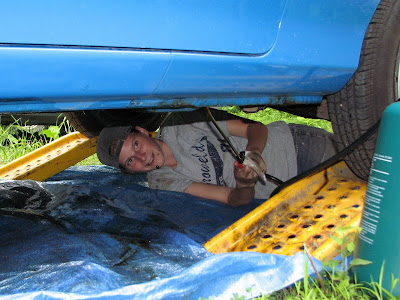I take the old English textbook out of my dusty bookcase and turn to Robert Frost's "Mowing." Scythe...whispered...the heat of the sun...the feeble-pointed spires of flowers...a bright green snake. I expect that he was just as proficient as a mower as he was poet since poetry seems to sprout best out of the simple tasks of life. But as I look out the window at my own work, I know that not even someone tipsy with the exilarating green of a Vermont summer would hire
me to
scythe their field. It is ragged, vetch and daises torn up along with the grass. And somehow I think that Frost
didn't think to mention the sweat trickling down behind the ears to the neck, the deer flies tangling themselves in the curls of hair and buzzing entrapped against the head, the scythe blade that becomes dull too quickly, or the strain felt from the stomach, out to the elbows, and up to the shoulders. And yet I guess that was part of Frost's skill--to not state the obvious unless there was a peculiar way to tell it. I suppose too that is why he only hints at the gracefulness of a practiced scyther like my father, where the whisper and the motion and the waves of falling grass and ferns far out-feel the deer fly biting the arm.

---
I bring the textbook downstairs to the kitchen where the floor wafts up pine-scented amonia and where the counters bear evidence of my supper plans. My parents haven been spending a few precious days in celebration of thirty years together, and now I have one quiet hour to spend out by the pond while my grandmother is visiting her sister. Earlier this morning as I misted water over her head and picked out her permed curls and then as the extra water slipped into her eyes and I had to bring her a towel to wipe them, I couldn't help wondering at the way we have swapped our roles--unwillingly perhaps at first, but now in some sort of secure acceptance. Not
that many years ago she might have been bathing me, a baby small enough to sit in her large kitchen sink, she carefully watching that the shampoo didn't get in my eyes. Or perhaps when I was a little older she might have knocked on the bathroom door to make sure I didn't need help, like I do now for her, or take me for a walk on the old road behind her house or down to the bridge to feed the river, I having to trust that she knew where we was going. And she was the one trying to keep
me dry when it started to rain.

---
The English I taught in Honduras was an English that a good many people could teach. The muddy mile I walked each day was a mile that most could walk. The electricityless, laundry-hand-washing life was a life that a number of folks could live. But I suppose I need not state the obvious so commonlike... I guess the point is that I had
something to work on in Honduras. It is kind of like our part in the plan of Redemption. If efficiency was all that mattered, God would be much better off doing the work Himself. And yet He has given us the opportunity to experience His servanthood, to experience the simple moments of life freshly, poetically, to experience new thoughts about the people around us and the love to be passed on.
Christ was a servant, the True Servant, bending down to clean the dust-covered callouses and the dirty toenails, allowing the lepers to approach Him and kneel at His feet, healing the grandmothers, the aunts and uncles, the children. And that's something to keep learning, in Honduras, yes, but in the field, in the home, and ever.




